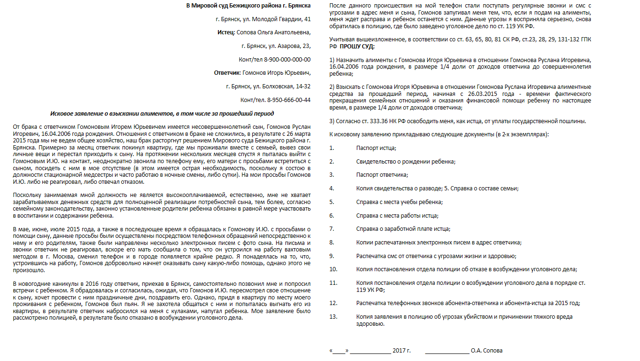The general rule is as follows: collection of alimony for the past period for the maintenance of a child is possible only when the court decision enters into legal force. The initiator of an appeal to the help of this government institution is one of the parents.
The legislative framework

- A written agreement between both parents of a child. The amount of alimony obligations, frequency of payment, and other issues as agreed upon by the parties are indicated. The document must be certified by a notary.
- Court order at the request of the claimant.
- A writ of execution obtained on the basis of a court decision.
The law allows that you can be in a marital relationship and at the same time raise the issue of child support payments.
Conditions for collecting alimony from the previous period
In order to collect alimony for previous years, the period when such a right arose does not matter. It is only necessary to comply with certain conditions. So:
- the claimant should file a claim with the court;
- the executive document is a written agreement between the father and mother of the child;
- written evidence of the debtor's evasion of assumed responsibilities.
The statement of claim must have attachments in the form of: letters, telegrams, SMS correspondence with a requirement to provide material and financial assistance for the maintenance of the child. Evidence may include testimony from witnesses as to why the marriage was dissolved. During the trial, they will speak orally about the circumstances of the case.
Legal grounds for collecting alimony from the past period
The legislation provides the opportunity to collect alimony for the past period in two prescribed ways:
- Provided that alimony has not previously been awarded through the courts, collection can be carried out within the three-year limitation period. This provision is provided for in part two of Article 107 of the RF IC. The countdown begins from the day you go to court. To do this, it is necessary to calculate the debt and provide evidence of taking measures to claim alimony that was not paid due to the debtor’s evasion.
- If the issue of child support was settled by a written agreement between the parents or a court document at the claim of one of them, and the debtor evades, the rules of Part 2 of Article 113 of the Family Code apply. The alimony debt is subject to collection for the entire period of non-payment, without taking into account the statute of limitations. The maximum size is not limited by law.
Arbitrage practice

If the father of a minor is hiding, unwilling to pay, court practice suggests taking the following steps:
- Application of legal measures to obtain sufficient funds to support a young child.
- Collection of evidence that confirms the parent’s systematic evasion from paying established payments.
- Submitting a statement of claim to collect the accumulated debt from the previous period.
- Issuance by the court of a writ of execution after the decision has entered into legal force.
- Submitting an application and writ of execution to the bailiff service. This is the final step towards enforcement.
The provisions and commentary of Chapter Seventeen of the Family Code confirm that the assistance of the court should be sought as soon as the need arises. The three-year time requirement does not apply.
That is, the period for which alimony can be collected is not limited by law. The amount of payment owed by the obligated person is awarded from the date of application to the court.
Such conclusions are confirmed by the Supreme Court, issuing an appropriate clarification that is binding.
Some nuances of collection
At the beginning of June 2016, a new legislative act regarding the collection of payments for the maintenance of minor children came into force.
Thus, if the father and mother of the child do not face the question of establishing or challenging paternity through DNA testing, or involving other persons in the dispute, then a simplified form of the process is applied.
The jurisdiction of alimony cases is assigned to the magistrate, who within five days issues a court order, which is an executive document. Usually the initiator of the appeal is the ex-wife. The husband has the right to object.
Calculation of payments for the past period

To do this, the following possible options are applied, set out in Art. 113 Family Code:
- the amount is determined as a share of the debtor’s income;
- is calculated as a fixed amount in national currency, based on the minimum legally established wage. The resulting value is subject to monthly indexation as compensation for the inflationary process;
- based on the terms of the written agreement concluded between the parents;
- in accordance with the provisions specified in the court decision.
If the alimony holder is a persistent defaulter, a penalty may be applied. Its amount is 0.5% for each day of delay.
Therefore, when going to court, the amount of debt must be recalculated taking into account the stated requirements. The debtor's complaint against the application of such sanctions will not be satisfied.
To index the amounts collected, a special formula is used. Here is her example:
SIA = PPM / PM x A SIA - the amount of indexed alimony PM - the current indicator of the subsistence level
A - the amount of payments before indexation was made
Evasion and liability
Protecting the interests of children forces the state to bring to certain types of liability a person who evades payment of alimony. Current legislation provides:
- Application of a daily penalty for late payment for a persistent alimony defaulter.
- Compensation for losses caused by non-payment of alimony, which is not covered by the penalty. In this case, the law provides for the return of the paid state duty.
- Imposition of administrative punishment under Article 17.14 of the Code of Administrative Offenses for failure to comply with the legal requirements of an official of the bailiff service.
- Temporary restriction on traveling outside the country until the debt on alimony obligations is repaid.
- Preventive period for deprivation of a special right to drive a vehicle if the amount of debt exceeds 10 thousand rubles. Cancellation of this measure is possible after full repayment of the debt.
- Criminal liability under Article 157 of the Criminal Code of the Russian Federation.
It is the responsibility of the alimony payer to prove his innocence.
Alimony agreement. How to collect a debt?

The document regulates the amount, procedure and method of payment of alimony. It is subject to mandatory notarization and must comply with the requirements of civil law applicable to contractual relations. The agreement allows us to legitimize an out-of-court method of resolving a dispute between parents regarding child support.
You can change, add, or demand termination of the agreement in the same manner as it was concluded - at any time. Failure to comply with this requirement entails the illegality of all subsequent actions related to the document.
As legal practice shows, the parties independently determine the frequency of payments by agreement. In this case, payment of alimony can be made once. It is also possible to provide the claimant with specific property at the expense of the fulfillment of parental responsibilities.
Since the alimony agreement is classified by law as an executive document, if the payer violates its obligations, a voluntary method of resolving the issue may develop into a forced one.
To do this, the collector is not obliged to ask the debtor’s consent and has the right:
- Contact the debtor's employer, demanding that the necessary payments be collected from wages. A written agreement is attached to the application.
- Submit an application to the bailiff service for the collection of alimony obligations, attaching a written agreement.
The accounting department accepts for execution and withholds alimony in accordance with the terms of the document provided. After dismissal of the debtor, the previous employer is obliged to return the written agreement to the claimant. It can also be collected by an authorized representative of the payee.
The bailiff is obliged to open enforcement proceedings and take measures provided for by law to implement the alimony agreement. Achieving a positive result directly depends on the evidence presented by the plaintiff.
Statement of claim - what you should pay attention to

The payer continues to evade payment in every possible way. The first step is to prepare a statement of claim. It should:
- Justify the requirements for collecting arrears of alimony for the past period of time.
- Show the previous move that was used to receive financial assistance.
- Provide conclusive evidence of the defendant's evasion from fulfilling his duties.
- Provide a calculation of detailed debt for the time period of the limitation period. Indicate the exact amount to be recovered from the defendant.
In each specific case, the list of attached documents will depend on the actual circumstances of the case. The pensioner is also obliged to pay alimony. Therefore, a claim can be brought against him. The law allows funds to be withheld from all other types of pensions.
The responsible employee of the office of the judicial authority is required to register the statement of claim with the attached documents.
Is it possible to demand child support for previous years: the correct answer for parents raising a child on their own
Whether it is possible to demand child support for previous years is not known to every parent who single-handedly “raises” a child. Many couples, after separating, raise and provide for the baby on their own, without the participation of the father (most often) or mother. Let us consider in detail how to restore justice.
Deadlines for paying alimony
 Deadlines for paying alimony
Deadlines for paying alimony
The responsibility of every able-bodied parent is to support their minor offspring. It does not matter where the second parent lives: in the same territory with the child or in different places.
Even if the couple is legally married, but the father (we will call it conditionally) for some reason decided to leave the family, or decided to change his place of residence, then he has an obligation to regularly provide money for the child’s daily needs.
A conscientious parent continues to provide for his offspring (sometimes his ex-wife) voluntarily. In this case, it is advisable to conclude an agreement, which is otherwise called a marriage agreement. In an official document, state various conditions that satisfy two parties:
- timing of cash payments;
- amount;
- an event that ends the validity of this contract.
This procedure is extremely necessary. The fact is that an oral agreement does not carry legal force and is not evidence in court. And often you have to defend the rights of your son/daughter in the “temple of Themis”.
The law establishes that child support must be calculated:
- starting from the date of filing the claim;
- when the voluntary agreement came into force.
Child support payments stop when the child:
- or the alimony payer has passed away;
- the child has reached adulthood;
- judicially recognized as legally competent until the age of 18 (emancipation), the minor is released from parental care;
- was adopted by the new spouse of his parent;
- violated the law and is accused of committing an intentional crime against the parent who pays support.
Some situations provide for a reduction in the amount of alimony:
- the ward began working;
- the alimony payer became a pensioner, lost his ability to work (disability was established), received a demotion - in a word, his income decreased;
- the parent living with the child has legalized his relationship with another person, for example, the minor’s mother got married, and the new spouse is not going to adopt his stepson/stepdaughter;
- too much maintenance.
Regarding the payment period: by law, the alimony payer is obliged to transfer the required amount within three days from the date of receipt of wages. There are no difficulties if the defendant is employed - the alimony payment is sent by the accounting department.
If former spouses enter into a voluntary agreement, then the agreement on the terms may be oral or more flexible terms may be prescribed. The most important thing is to respect the rights of the child.
Is it possible to obtain alimony for the past period through the court?
Any parent raising a child on their own has every right to collect child support from their ex-spouse. Some circumstances allow the mother (in most cases) to claim maintenance for previous years. The court needs evidence that:
- after the breakup of the family, the second parent did not provide financial support;
- the mother did everything possible to get the money due to the child;
- the father avoided paying child support in every possible way.
The mother of a minor files for alimony immediately after the divorce, or the parties enter into a voluntary agreement. 5 years pass after this event. But the baby’s father has not made a single payment for the entire period - for some reason he evades paying child support.
In court, the plaintiff will be able to claim the debt for the past period.
Very often, wealthy women, after a divorce, refuse to pay maintenance and want to raise a child without outside help. But life is unpredictable, and it happens that after 5-6 years a divorced mother loses her job, her income level decreases, or her offspring’s demands increase.
She turns to her husband, but he simply “feeds her with promises.” Justice can be restored through the courts. You can only request alimony for the previous 3 years, and not for 5-6 years.
There are cases when an adult child independently demands payment of maintenance from a parent who did not live with him. The conditions are exactly the same as in the examples:
- the period is limited to three years, if the application has not been submitted previously;
- when the application is resubmitted, the child is entitled to penalties and compensation in addition to the principal amount owed.
How to calculate alimony for the past period
There are several options for calculating child support for past years.
The parties entered into a voluntary agreement, in which they clearly indicated the amount of the so-called fixed sum of money - the funds necessary to provide for the baby.
If payments are not received, for example, 4 years, then this period of time is taken into account (48 months). It is necessary to multiply the number of months by the amount of the obligation. Thus, we get the amount of alimony debt.
When an application is submitted for the first time, as a rule, alimony is awarded as a share of income:
- one minor is entitled to 25% of the total salary;
- if there are two children - 33%;
- three or more - half the earnings.
 Options for calculating alimony for previous years
Options for calculating alimony for previous years
The defendant provides a document confirming the income received for the required period. First, calculate the amount as a percentage for each month, then add up the results. The total amount will be the total debt.
It often happens that a person cannot provide a certificate of earnings (information is lost, unofficial employment). In such a situation, the court orders payment in a fixed amount of money. The benefit amount is calculated based on the average salary in the region where the child lives.
Important! Those wishing to avoid paying alimony must take into account that the law provides for fines. The penalty amount is 0.5% for each day of non-payment.
The procedure for collecting alimony
First of all, a single mother/father should contact her ex-spouse and try to come to an agreement. Perhaps the child's father/mother will agree to sign a voluntary child support agreement in the presence of a notary. This will avoid many problems.
- When persuasion does not work and one of the parents refuses to help, or does not refuse, but simply does not pay maintenance, it is necessary to contact the judicial authorities as soon as possible - the magistrate's court.
- As practice shows, it would be more correct to demand alimony for the previous period at the place of residence of the defaulter.
- Step-by-step instructions for parents who want to restore justice.
- The parent raising the child files a claim with the court. It is necessary to pay special attention to the content of the claim:
- indicate the name of the judicial authority;
- list of attached documents;
- full information about the parties to the case (plaintiff and defendant);
- competently justify why legal proceedings have been initiated.
- Collect a complete package of documents.
- Wait for a court decision or get a court order.
- The court decision is made when a full court hearing is held - 30 days after filing the claim. Sometimes this act is issued without a court hearing and the participation of the defendant.
- The court order is issued within a week from the date of filing the statement of claim. Used as a writ of execution. There is no court hearing to issue such a document; the judge makes a decision alone.
- Provide writs of execution to bailiffs.
- Be prepared for an objection from the defendant. For example, the father of the family wants to challenge the amount of payments or the order of deductions.
Initial appeal
 Primary and secondary treatment
Primary and secondary treatment
When initially contacting the authorities, the plaintiff provides the necessary package of documents. After receiving the writ of execution (writ of execution, court order), you need to transfer them to the bailiffs.
If the alimony payer is employed, then the documents are sent to the place of work. In this case, the employer makes the contributions.
When the defendant systematically evades paying alimony, officials seize the property of the persistent defaulter.
Important! Parents who do not fulfill their obligations to pay maintenance for their own child can be deprived of parental rights without much effort.
Repeated appeal
Not for every parent a court decision is a document that obliges them to pay child support. Many people ignore payment, thereby provoking the custodial parent to go to court again.
Before going to the authorities for help, the mother/father of a minor must receive a certificate indicating the amount of debt. This document is issued by the executive service.
The procedure is repeated: the parent goes to court, draws up a statement of claim, receives a decision, and appeals to the bailiffs again. The second time, the actions of the executors of punishment may differ, since they have the right to seize the property of the defendant parent, or issue a ban on leaving the country.
What documents are needed
The court needs the following documents:
- identification document of the parent and child (have the originals with you and prepare copies);
- a document confirming family status (marriage or divorce certificate);
- official document on the amount of earnings;
- a certificate confirming that the plaintiff and the child live together;
- a copy of the court decision or voluntary agreement (if any);
- approximate calculation of alimony debt;
- confirm with documents attempts to obtain support for a common child.
Evidence of lack of financial assistance may include:
- receipts, checks confirming the costs of raising a child - treatment, tuition, kindergarten, entertainment, etc.);
- labor report, which states that the plaintiff does not work;
- an account statement proving the absence of cash receipts;
- information confirming that the defendant is wanted;
- electronic or paper correspondence.
Arbitrage practice
The law provides for a three-year period to request child support. But unfortunately, rarely does anyone manage to restore justice during the initial appeal - this is what judicial practice shows.
The fact is that not everyone is able to collect materials proving the lack of participation of the second parent in the child’s life. Supporting facts must be true and not raise doubts. In addition, it is necessary to correctly draw up a statement of claim:
- describe in detail the relationship with the defendant before and after the divorce;
- indicate where the money to support the family came from;
- reasons why the other parent did not help financially;
- attach checks and receipts for payment for goods and services, which show that the money was spent on the child.
In conclusion, it should be noted: it is much better to resolve the issue peacefully. For example, draw up an agreement, or voluntarily allocate funds for your own child. From this article you learned how to demand alimony for past years if an agreement could not be reached.
How to collect alimony for the past period? Consultation with lawyer Pavel Lyska:
Select it and press Ctrl+Enter to let us know.
Collection of alimony for the past period: collection procedure and judicial practice

Concealing parents from paying child support is, unfortunately, commonplace these days. What unconscious fathers do is to avoid parental financial responsibility: they hide their place of work, receive salaries in envelopes, and hide themselves. To suppress such facts, the law provides for the collection of alimony for the past period of time. We will analyze in detail all the conditions and the procedure for such collection.
Is it possible to recover alimony for previous years?
The issue of collecting child support for the past period is addressed in Article 107 of the Family Code, or more precisely, its part 2, paragraph 2. If the father refuses to voluntarily financially support his child, then the mother has the right to resolve the issue through the court. Payments will be accrued to the child from the moment the decision of the judicial authority enters into legal force.
However, the law provides exceptions. They are contained in Part 1 of Article 108 of the Law. So, if during the trial of the case in court the mother does not have the financial means to support the baby, then she has the right to petition for the establishment of payments until the issue is resolved.
As a rule, in such cases, judges are willing to meet the plaintiffs halfway and issue an appropriate order on the assignment of payments before making a decision.
Deadlines
The parent involved in the upbringing and financial support of the child can initiate the process of collecting alimony at any time, until he turns eighteen years old. For example, until the child turned ten years old, the mother living with him had no financial difficulties in providing for the baby, and only then was she forced to demand alimony from the father.
If the issue is related to the second parent’s evasion of obligations, then alimony can be recovered even after the child reaches adulthood for lost time.
For example, until his daughter turned eighteen, her father deliberately hid from fulfilling his obligations.
According to the provisions of the Code, the mother has the right to file a claim for the recovery of alimony for the past period, in this case, before her daughter turns 21, three years from the date of the lost opportunity.
For what period can alimony be collected?
The Family Code sets a deadline for applications to recover payments for children – three years. We dare to suggest that this period is borrowed from the provisions of civil legislation, namely from the content of Article 196 of the Civil Code.
It establishes the limitation period for all civil cases. Since the solution to the issue of collecting alimony for the past period relates to such cases, a similar statute of limitations has been established.
Within three years from the date of lost rights, the parent can defend the interests of the child in court.
Conditions for collecting alimony for the past period
Proceedings regarding the collection of alimony for a past period of time are specific, in contrast to the classic examples of alimony cases. Processes are always associated with consideration of facts of evasion of parental responsibility by the other party.
The initiating party must submit to the judge’s attention documents proving unsuccessful attempts to achieve financial support for the child.
In other words, the mother of a minor sends letters to the father demanding payment of funds for the maintenance of the child, calls him, and sends messages to his postal address. All attempts are ultimately futile.
The mandatory conditions under which the court can positively decide the issue of collecting funds for the maintenance of the child for previous years are the following:
| No. | Conditions |
| 1. | Blood connection between the child, against whom payments are being collected, and the father or mother - the defendant. In the absence of such a connection, the plaintiff must first file a separate claim with the judicial authority to establish the fact of paternity. |
| 2. | The period of past years for which alimony is supposed to be collected must be in the period of time - from the birth to the child’s 18th birthday, since after this period it is impossible to claim payments. The only exceptions are cases of disability and incapacity for work of adult children. |
| 3. | The facts of seeking help from the defendant father must be documented in court. |
| 4. | The parent to whom the demand is made evades payment of funds. |
The conditions given in the table are the main ones in relation to such cases. We should also not forget about other dominant circumstances in which it is possible to demand alimony in court:
- voluntary refusal of a parent to provide for his child;
- the baby's neediness;
- the difficult financial situation of the parent who lives with the child and is fully involved in raising him.
These conditions are taken into account by judges when considering absolutely all alimony cases.
The procedure for collecting arrears of alimony for the past period
You can demand payment of funds for child support for previous years either verbally or in the form of decisive actions: drawing up a notarial agreement on this or filing a claim in court. You can demand payments not only for the maintenance of minor children, but also:
- for adult children over 18 years of age who have disabilities or are otherwise unable to work;
- for children born out of wedlock, provided that they are legal by virtue of a birth document or a court decision;
- for parents who, due to old age or disability, are deprived of the opportunity to earn money for their food;
- for current or former spouses in cases prescribed by law;
- for a current or former wife raising a joint child under three years of age.
All these cases are regulated in detail in the articles of the Code.
Registration of a mutual agreement
If the defendant finally stops avoiding obligations and agrees to pay the debt, then the parties can draw up a notarial agreement on this.
In the document, the father, who was previously hiding from responsibility, accepts in writing the responsibility to pay everything due to the child for previous years, plus accrued interest for any delays. The amount of debt of the parties is determined by mutual agreement.
Once certified by a notary, the document acquires legal force. If the responding party ignores the requirements specified in it, it is possible to defend the interests of the child through the court.
Features of the trial
Filing a lawsuit to collect alimony for a past period of time has some features.
The Plenum of the Supreme Court clarifies that such cases are considered exclusively by way of claim proceedings.
Judges are not allowed to order the collection of alimony debt for the past time. Based on this, the plaintiff parent does not file an application demanding an order, but rather a lawsuit.
Primary attention in the process of judicial research is given to the evidence base in the case. The plaintiff mother must document the following important facts before the court:
- the fact that she repeatedly made attempts in relation to the father to demand financial support for the child;
- the fact that these attempts were ignored;
- the fact that the father consciously, i.e. without good reason, avoided parental responsibility.
The law provides that if the defendant father did not pay child support due to illness or other significant reasons, then he may be released by the judge from paying the debt or some part of it.
Evidence base
How can a mother prove her requests for financial assistance? You can do this in two ways:
- Collecting all supporting documents. These include: notifications of letters being sent to the father’s home address, printouts of phone calls and SMS correspondence, printouts of letters sent to an email inbox, and dialogues from social networks.
- Bringing witnesses into the courtroom. Neighbors, friends and colleagues can confirm the fact that the mother sent letters and other types of messages to the father demanding financial assistance for the child, but there was no response.
Important facts can be confirmed in all non-prohibited ways; it all depends on the ingenuity and dexterity of obtaining evidence.
Procedure for filing a claim
A statement of claim for the recovery of alimony for the past period is filed with the district court at the place of residence of the father evading his financial obligations. Magistrates are no longer competent in such matters. The following documents are submitted along with the claim:
- passport of the plaintiff mother;
- a document on marriage or divorce (the process can be initiated equally both while in a marital relationship and after its dissolution);
- birth document of the child (children);
- agreement on payment of alimony (if it was drawn up);
- a certificate indicating the amount of income of the mother;
- a certificate confirming the amount of the father’s earnings (if available);
- certificate from the applicant’s place of residence;
- documents confirming the fact of an appeal to the father with a request for payment of alimony;
- documents confirming the fact of the father's evasion of responsibility.
Due to the specifics of the case, the list of papers is expanded compared to ordinary cases. State duty is not paid.
The period for consideration of the case by the judge is one month from the date of application.
Statement of claim
It is important to reflect all the circumstances in the claim. The required elements of the application will be:
- the name of the court district where the claim is sent;
- information about the applicant: passport details, registration;
- information about the defendant;
- material value of the stated requirements;
- descriptive part: from what moment the defendant refused to pay alimony, what attempts were made by the plaintiff to obtain it, what is the total period of non-payment of funds;
- pleading part: requirement to collect alimony for a specific period of time, taking into account fines for late payments;
- a list of documents attached to the claim;
- number and signature.

The claim is drawn up in three copies, if no other persons are involved in the process (download sample).
How to calculate child support for the past period
The calculation of child support payments for the past period directly depends on whether they are collected as a percentage of the earnings of the respondent parent or as a fixed sum of money. If the father does not have official employment or receives irregular earnings, then alimony is awarded in cash equivalent. In all other cases, interest is awarded according to the general rules.
Payment with a fixed amount
If alimony is established in monetary terms, then the total amount of debt is calculated by multiplying the monthly amount of alimony awarded by the number of months of the past period.
For example, a parent was required to pay 20,000 rubles monthly for child support as part of a formalized agreement. He made no payments for one year.
Accordingly, 20,000 × 12 = 240,000 rubles is the total amount to be paid by the defendant.
Payment when assigning alimony as a percentage
According to the principles of enforcement proceedings in relation to debtors who evade payment of debt, the amounts are doubled by 50%. Let's take as an example the same monthly amount - 20,000 rubles, only as a percentage.
20,000 × 50% = 10,000, 20,000 + 10,000 = 30,000 rubles – payment amount for one month. For a year of delay, the total amount to be repaid will be equal to 360,000 rubles. 120,000 rubles is the price of penalties applied to the defendant.
It should be noted that penalties can only be assessed when the defendant had a documented obligation to pay alimony.
For example, if paternity is recognized through the court before the fact of relationship is established, demands for payments cannot be made against the father, which means that penalties and penalties cannot be applied.
This state of affairs is quite logical; a person should not fulfill financial responsibilities, since he is not legally a father.
Responsibility for evasion of alimony payments for past periods
For a citizen’s evasion of the obligation to pay alimony, including for past years, the following negative legal consequences occur:
- compensation in the form of a penalty - ½% for each overdue day (clause 2 of Article 115 of the Law);
- seizure of any type of property of the debtor parent;
- deprivation of a driver's license if the amount of the resulting alimony debt exceeds 10,000 rubles;
- restrictions on leaving the state;
- putting a citizen on the wanted list;
- initiation of a criminal case under Article 157 of the Criminal Code of the Russian Federation.
Even after being imprisoned, a citizen is not exempt from paying the debt. If the convicted person is employed, then monthly deductions are made to the child from the earnings received, even minimal ones. If a citizen in prison refuses to work, then the amount of debt accumulates. Upon release, the defendant will be required to repay the entire debt plus penalties.
Arbitrage practice
The Plenum of the Supreme Court annually sums up the results of judicial work in various areas of activity. The clarifications also apply to alimony proceedings.
Cases have been recorded where plaintiffs erroneously sent applications for the recovery of payments for previous years to magistrates.
Consideration of such cases, taking into account the specifics and complexity, should be carried out strictly in courts of general jurisdiction.
Errors were made in determining the period for collecting funds for child support when paternity was proven in court. Child support cannot be calculated for those years when paternity has not been legally established.
Let's summarize. Collection of child support for the past period is a rather complex procedure. The process has the following comparative features:
- the debt can be collected even after the child turns 18, but later than three years after the day the right was lost;
- You can demand payment of alimony for illegitimate children only after recognition of paternity through the court;
- collection of alimony for the past period is allowed both during marriage and after divorce;
- legal proceedings are initiated only by way of legal proceedings;
- When considering a case in court, evidence of the fact that the plaintiff made attempts to demand payments and the fact that the defendant evaded responsibility is of paramount importance.
Despite the complexity and specificity of participation in such processes, the judicial practice of collecting alimony over the past period shows that with the high interest and preparedness of the plaintiff, the issue is resolved in a positive way.
Still have questions on the topic Ask a lawyer
If after a divorce the father “forgot” about supporting the child, is it possible to collect alimony for previous years and how exactly?
There are conscientious parents who continue to take care of their children and provide for them financially after the breakup of the family union, but not all of them. As practice shows, a decent number of fathers who left the family remember the obligation to pay alimony only after the child’s mother goes to court.
The legislation provides for the possibility of collecting the amount of alimony for the past period when the father did not respond to all sorts of requests from the mother for financial support. Let us consider within what time frame and how exactly alimony payments can be collected.
Dear readers! Our articles talk about typical ways to resolve legal issues, but each case is unique.
If you want to find out how to solve your particular problem, please use the online consultant form on the right or call +7 (499) 938-46-18. It's fast and free!
Show content
Is it possible to recover money for a child for previous years?
Quite often, one of the parents has to spend a long time trying to obtain the funds required by law for the child. Due to constant promises from the father, mothers put off filing a lawsuit.
To fill the need for material support for the past period, Art. 107 of the Family Code of the Russian Federation (FC RF) provides for the possibility of recovering funds from the alimony payer for the three years preceding the application to the judicial authority.
Can they recover funds that a parent has evaded paying for the past three years? Yes, but for this the following conditions must be met:
- The person from whom the applicant wants to collect alimony must have a documented relationship with the child.
Important! If paternity has been established in court proceedings, then alimony payments can be collected only from the moment this decision is made by the court.
- The child’s mother has not previously filed a claim in court to collect child support for him. If a writ of execution has already been issued, then the alimony payer has accumulated a debt for the period of non-payment, which has no statute of limitations and can be collected for the entire period.
- The absence of an alimony agreement between the spouses, which confirms the voluntary consent of the parent to the payment of funds.
- The plaintiff must provide the court with evidence that confirms that the parent obligated to pay the money refused to fulfill his obligations.
If at least one of the above conditions is absent, then it will be impossible to collect alimony for the previous three years, since this would be contrary to the law.
Ways to receive funds
In accordance with the Family Code of the Russian Federation, there are two ways to recover unpaid funds from the alimony payer :
- by voluntary agreement between the parties;
- by applying to a judicial authority.
When concluding an agreement, the spouses independently agree on the amount of payments for the child, as well as the procedure for their implementation. If such a document is available, it is not necessary to prove the fact of sending requests to the alimony payer for the payment of alimony.
The alimony agreement must be notarized , otherwise the document will not have legal force, and, accordingly, it cannot be referred to when evading payments.
When concluding an agreement between the parties on the payment of funds for previous periods, the following points must be included in the document:
- the time period for which the alimony payer undertakes to transfer money;
- the amount of money the parties agreed to pay;
- the period during which the funds must be paid;
- the procedure for paying alimony (at one time or in installments).
If the parties cannot reach a common agreement, then the parent with whom the child lives has the right to file a lawsuit to recover unpaid money for previous periods. The court will make a decision on the amount and procedure for repaying the debt by the defendant .
Reference. In some cases, the court may make concessions by granting a deferment or installment plan for funds intended for payment for previous periods.
If the recipient of alimony has applied to the payer for a long period of time with a demand for payment of alimony, but he regularly refuses, and the recipient has significant evidence or witnesses, he can safely file a claim in court. A satisfactory decision in the case will allow the recovery of funds for the previous three years.
A parent whose rights have been violated must file a claim in court , supporting it with evidence and the necessary documents. The court may consider any documents if they confirm that the defendant is evading payment of alimony.
The main goal for the plaintiff at the court hearing is to prove to the court in every possible way that he has made numerous attempts to obtain alimony, but they have not been successful.
How else can you recover money for the last three years? Spouses can come to a solution to the issue peacefully by agreeing on all the details among themselves .
The result will be an agreement signed between them.
To do this, the parent who lives with the child and provides for him must contact the second parent with a proposal for joint financial support for the child.
When the spouses have reached a mutual decision, they go to a notary, who enters into an agreement indicating all the terms of payment, including the transfer of funds for the previous period.
A notarial agreement has legal force. In accordance with the document, the payer has certain obligations to pay funds.
Accrual procedure
Let us consider to what extent and under what conditions the collection of payments for the past is carried out. The amount of payments for the past period is calculated taking into account the same conditions that are taken into account when calculating future alimony:
- If for the period of time specified in the claim the payer had a constant official income, then the court may decide to collect alimony as a percentage of earnings (Article 81 of the RF IC).
- If over the past periods the alimony payer did not have a permanent place of work, was an individual entrepreneur, or his earnings were unstable, then in such cases the court will not be able to assign payments in shared terms, therefore, in accordance with Art. 83 of the RF IC, alimony will be established in a fixed amount.
- If the alimony payer owns any property that he is ready to transfer to the child in payment of unpaid alimony for the previous period, then the parties can agree on this option for repaying the debt.
Important! Each case of collection of alimony, including payments for the past period, is individual in nature, and in each specific case the court can make different decisions.
We wrote in more detail about the specifics of calculating alimony debt here, and from this article you will learn how to calculate the amount of the penalty.
How to file a lawsuit for the last three years?
An appeal to a judicial authority for the collection of alimony for the previous 3 years is submitted in the form of a statement of claim (a sample can be downloaded below). The document is drawn up in writing on the basis of Art. 131-132 of the Civil Procedure Code (Civil Procedure Code of the Russian Federation). The plaintiff must indicate the following points in the application:
- In the upper right corner the name of the court and its location, information about the applicant and defendant (full name, address, telephone number) are indicated.
- Below you should indicate the name of the claim: “On the collection of alimony for the past period.”
- In the text of the document itself, the plaintiff indicates the essence of the circumstances that have arisen, describes attempts and evidence of appealing to the defendant with a request to pay alimony, and indicates facts confirming the payer’s refusal to fulfill obligations.
- The applicant's demand to recover unpaid funds for the previous period, reference to Art. 107 RF IC.
- Documents and evidence attached to the case.
Article 107 of the RF IC. Deadlines for applying for alimony
- A person entitled to receive alimony has the right to apply to the court for the recovery of alimony, regardless of the period that has expired from the moment the right to alimony arose, if alimony was not previously paid under an agreement on the payment of alimony.
- Alimony is awarded from the moment you apply to the court.
Alimony for the past period can be recovered within a three-year period from the date of going to court, if the court establishes that before going to court, measures were taken to obtain funds for maintenance, but alimony was not received due to the evasion of the person obliged to pay alimony from paying it .
If it is necessary to invite witnesses to the court as evidence of the evasion of one of the parents from paying alimony, then the plaintiff must indicate a request to invite specific persons to the court hearing.
The claim is filed in the magistrate's court in person or by mail (Article 23 of the Code of Civil Procedure of the Russian Federation). You can choose a judicial body either at your own place of residence or at the place of residence of the defendant (Articles 28, 29 of the Code of Civil Procedure of the Russian Federation).
List of documents
In addition to the application for the recovery of funds, the plaintiff will need to provide additional documents confirming the information specified in the claim. These include:
- a copy of the applicant's passport;
- a copy of the birth certificate of the child in whose favor alimony is being collected;
- a copy of the certificate of marriage or divorce;
- a certificate of family composition, as confirmation of the fact that the plaintiff and the child live together;
- a certificate from the applicant’s employer confirming income level (if available);
- confirmation of the defendant’s income, if it is possible to provide such a document;
- evidence in the case.
Required evidence
To satisfy the filed claim for alimony for the past three years, the applicant will need to try to convince the court that during this time there were many attempts to obtain alimony, but the defendant did not respond to requests in any way, or completely hid his whereabouts.
To confirm the facts specified in the application, the following evidence may be used:
- records of telephone conversations in which a parent asks for financial assistance, to which the other parent refuses;
- telephone messages, social media messages or emails that are submitted to the court in printed form;
- testimony of persons acting as witnesses in the case who can confirm requests for financial support and refusals;
- sending postal letters with return receipt requested to the defendant’s place of residence, to which no response was received from him;
- payment documents that confirm expenses for the child;
- bank account statements that do not contain data on any transfers of funds from the alimony payer;
- any other evidence of non-fulfillment of alimony obligations.
On a note. The plaintiff should prepare a valid reason as an argument as to why the application to the court for payment of funds has not been submitted for a long period of time.
Recalculation of the amount of alimony payments, as well as the accumulated debt on them, can be carried out on the basis of a court decision. In this case, the cost of living indicators of previous periods and new data are taken into account. The entire amount of alimony unpaid over the past three years to the recipient is subject to recalculation.
Since the economic situation in the country could have changed significantly over three years, recalculation of payments will protect the rights of the recipient of funds.
How to receive alimony payments for the previous time?
The issue of collecting alimony for the previous period is not resolved in one day. To satisfy a claim in court, you will need to go through many stages :
- Prepare a package of documents - originals and copies, evidence.
- File a claim.
- Send an appeal to the magistrate's court.
- Waiting for documents to be accepted to begin legal proceedings.
- Receiving a summons to court to consider a case at a meeting.
- Participation in a court hearing, where the judge listens to both sides of the case and considers the evidence presented.
- Adjudication.
If the claim was satisfied, the writ of execution is sent to the defendant’s employer or to the bailiff service.
Statute of limitations
Collection of alimony for the previous period is carried out on the basis of Art. 107 RF IC. An applicant applying to the court to collect current payments can do this at any time before the child reaches the age of majority. If payments are required to be recovered for a previous period, then the law sets a time limit of three years before going to court.
Payments are limited to a period of 3 years if the issue is resolved in court. If both parties decide to enter into a voluntary agreement, then they can choose any period of time for which the alimony payer undertakes to pay the funds.
If, after many unfulfilled promises that alimony would be paid soon, the parent nevertheless decided to go to court to recover the funds required by law, including the last three-year period, then he needs to take the matter seriously.
If the plaintiff does not present to the court significant evidence that there were attempts to obtain funds from the payer, but he evaded in every possible way, then the court will not satisfy the claim, and the applicant will be able to claim only current alimony in the future.
From the video you will learn how to collect alimony, including for the three previous years. The lawyer says:
, please select a piece of text and press Ctrl+Enter.
Didn't find the answer to your question? Find out how to solve exactly your problem - call right now:
+7 (499) 938-46-18 (Moscow)
+7 (812) 425-63-64 (St. Petersburg)
It's fast and free!







